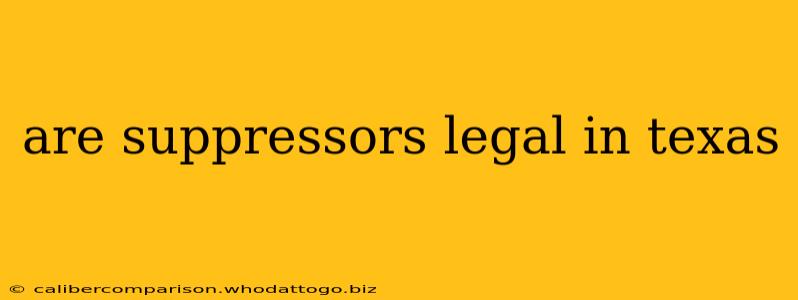The legality of firearm suppressors, often called silencers, in Texas can be a confusing topic. While the term "silencer" is commonly used, it's a misnomer; suppressors significantly reduce the sound of a gunshot, but they don't silence it completely. Understanding the regulations surrounding suppressor ownership and use in Texas requires careful attention to both state and federal laws.
Texas Suppressor Laws: The Basics
Texas law allows for the legal possession and use of firearm suppressors, provided all federal and state regulations are adhered to. This means that unlike some states, Texas doesn't have any additional state-level restrictions beyond the federal requirements.
Key Legal Considerations:
-
Federal Regulations: The primary governing body for suppressors is the Bureau of Alcohol, Tobacco, Firearms and Explosives (ATF). Federal law requires individuals to undergo a background check and register their suppressors with the ATF through a licensed dealer. This process is similar to purchasing a firearm.
-
State Licensing: Texas doesn't require a separate state-level license to own a suppressor. Compliance with federal regulations is sufficient to meet state requirements.
-
Permitted Uses: Suppressors can be legally used for hunting, target shooting, and other lawful purposes, as long as all applicable laws regarding firearm use are followed.
-
Prohibitions: It's crucial to understand that certain individuals are prohibited from owning suppressors, mirroring federal firearm restrictions. These include convicted felons, individuals with certain misdemeanor convictions, and those subject to restraining orders.
The ATF Registration Process: A Step-by-Step Guide
The federal registration process for suppressors involves several key steps:
-
Finding a Licensed Dealer: You must purchase a suppressor through a licensed firearms dealer who is registered with the ATF to handle NFA (National Firearms Act) items.
-
Completing ATF Form 4: This form requires detailed personal information, including fingerprints and photographs. Accurate and complete information is vital to avoid delays or rejection.
-
Background Check: Your application undergoes a thorough background check by the ATF. This process can take several months.
-
Tax Stamp: Upon approval, you'll receive a tax stamp, indicating the ATF has registered your suppressor. This tax stamp is crucial proof of legal ownership.
-
Possession: Once the tax stamp is issued, you can legally take possession of your suppressor.
Understanding Common Misconceptions
Several common misconceptions surround suppressor legality in Texas:
-
Silencing Myth: Suppressors significantly reduce the sound of a gunshot but don't silence it completely. The reduced noise level still poses a risk of hearing damage without proper hearing protection.
-
Automatic Weapon Restriction: While suppressors are sometimes associated with automatic weapons, their legal use isn't restricted to specific firearm types in Texas. However, all applicable laws regarding the possession and use of specific firearms still apply.
-
"Waiting Period" Misunderstanding: The time it takes to obtain a tax stamp from the ATF is not a "waiting period" in the same sense as a handgun waiting period. It's the time required for the background check and registration process.
Conclusion: Responsible Suppressor Ownership in Texas
Suppressor ownership is legal in Texas, but only when all federal and state laws are meticulously followed. Understanding the ATF registration process, the legal requirements, and the limitations of suppressors is crucial for responsible and lawful ownership. Always prioritize safety and adhere to all applicable firearm safety regulations. Consult with a legal professional or a knowledgeable firearms dealer for personalized guidance on suppressor acquisition and usage within the legal framework of Texas and federal law.

